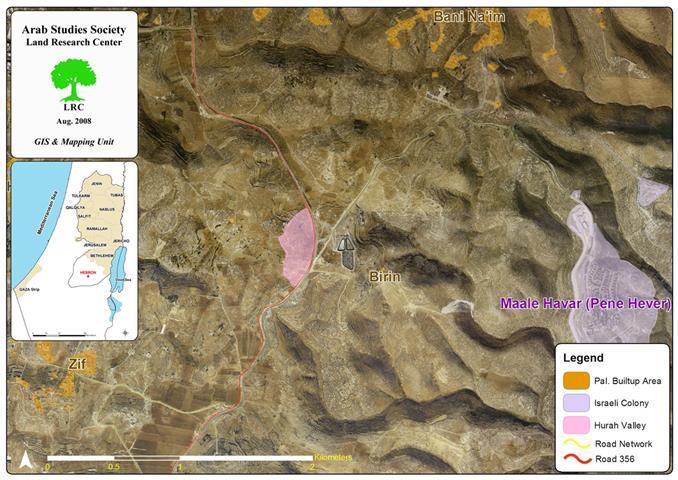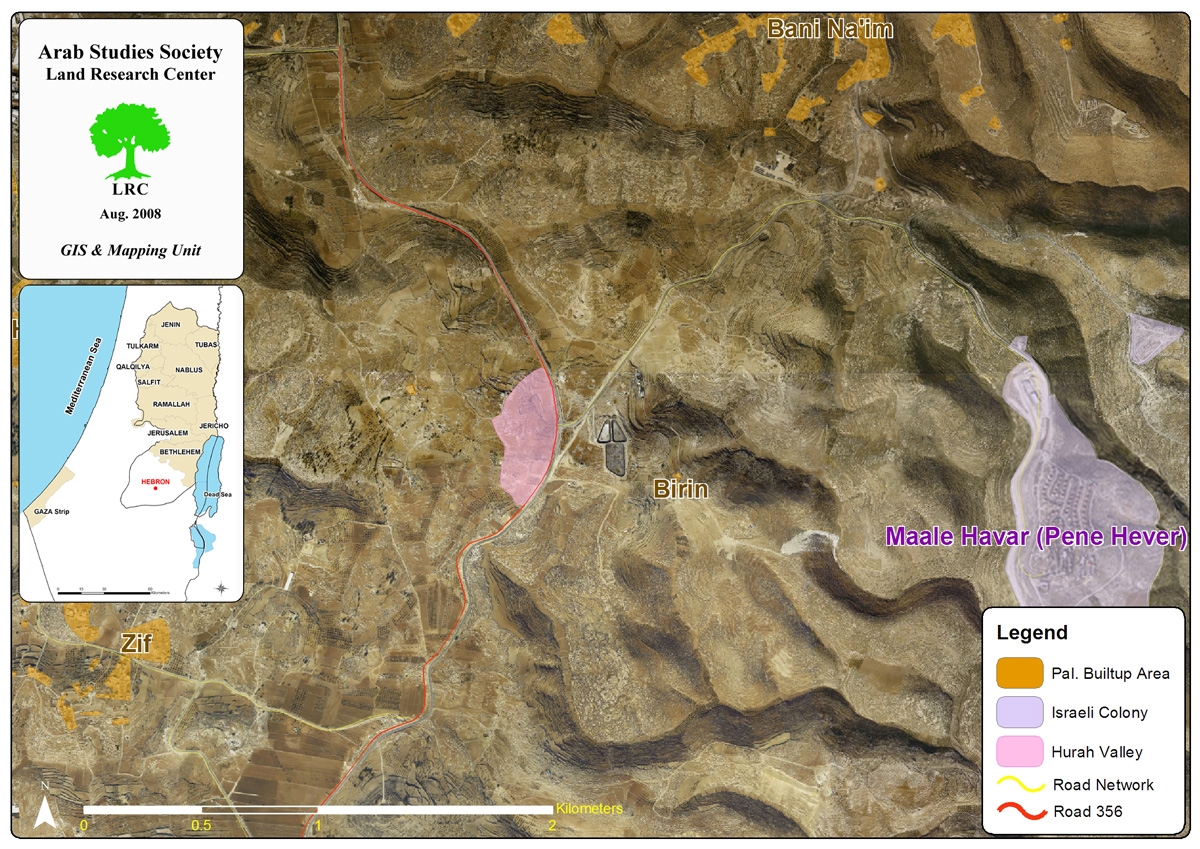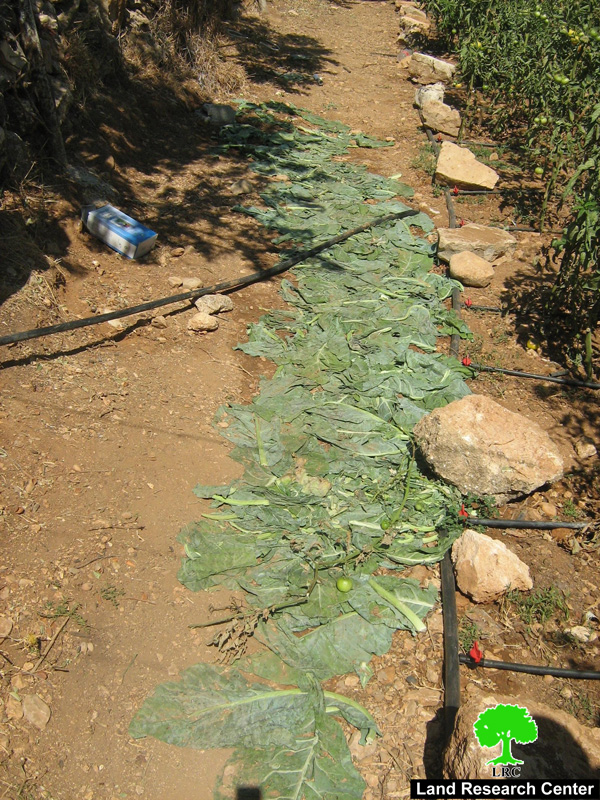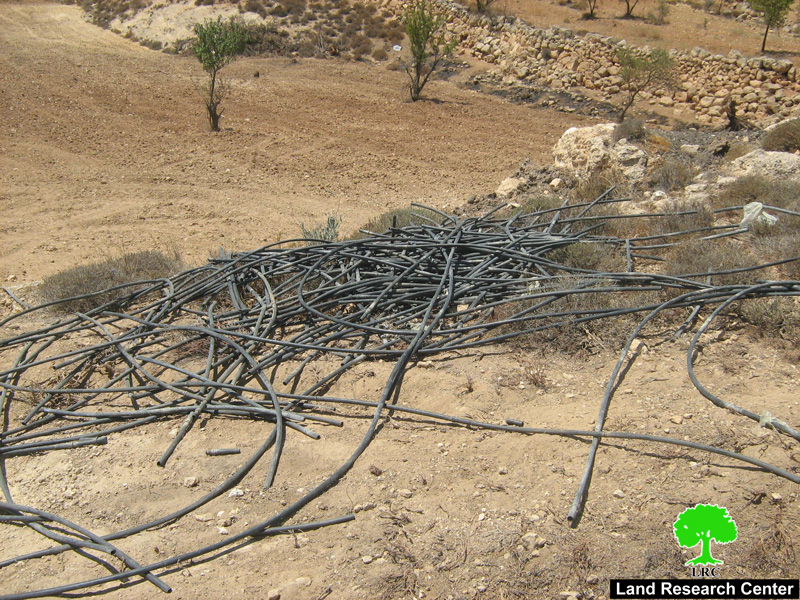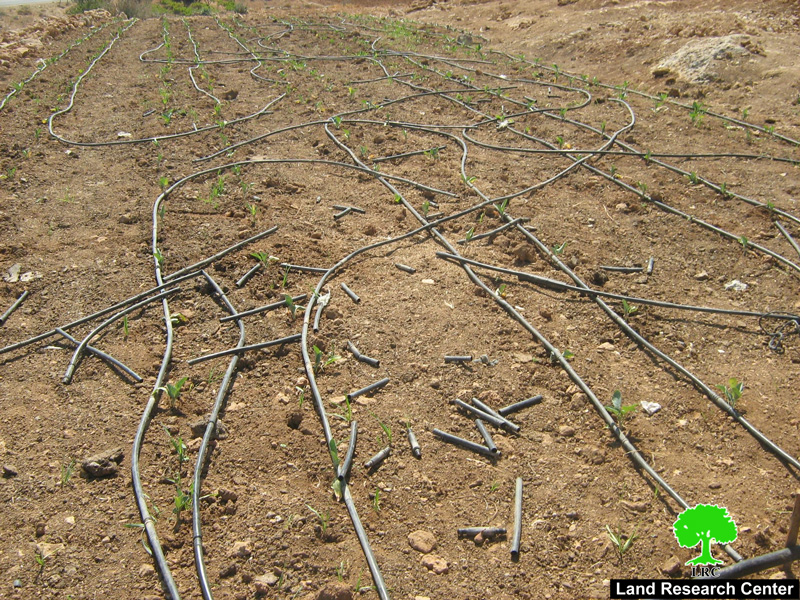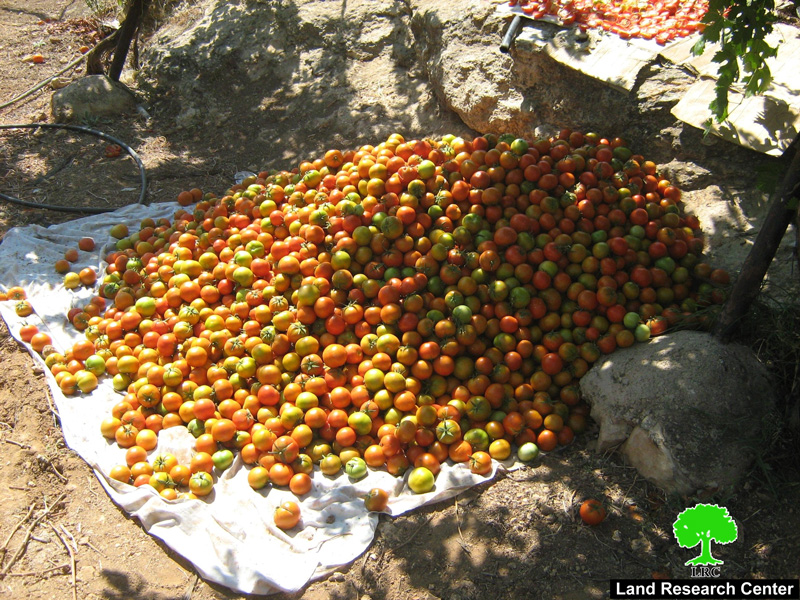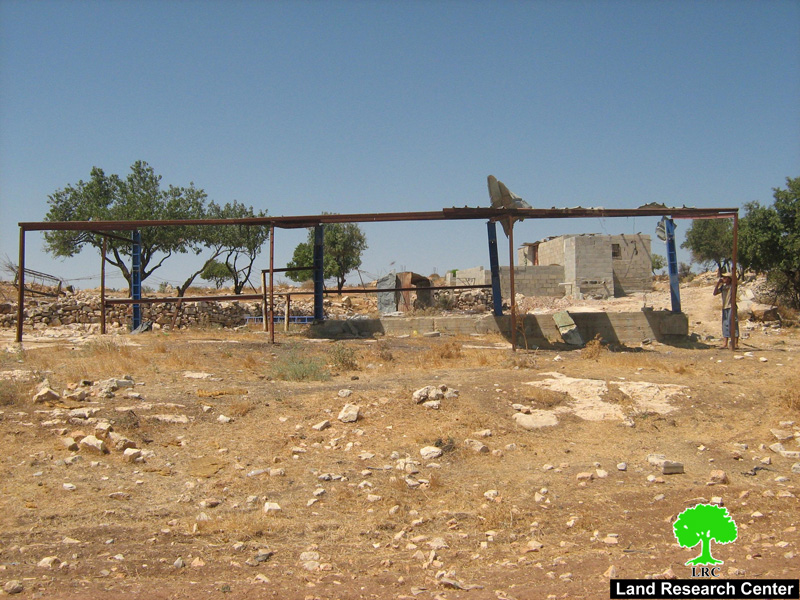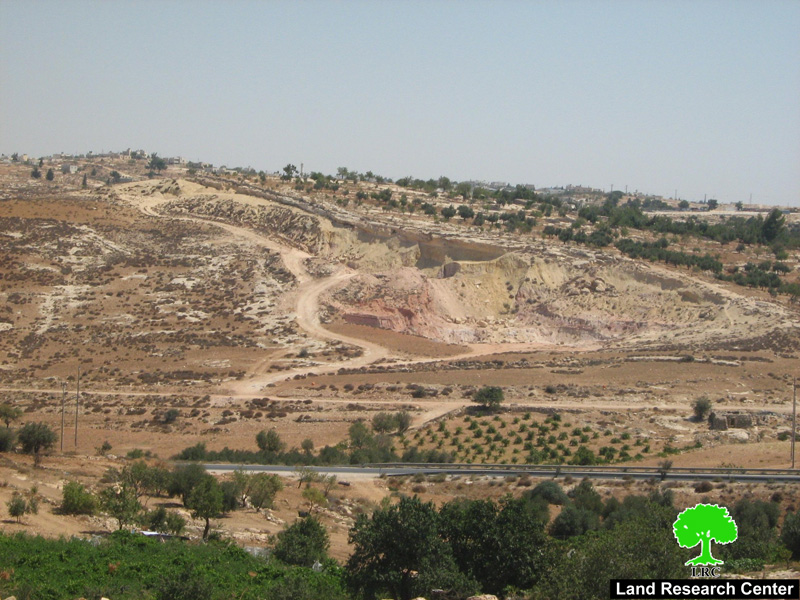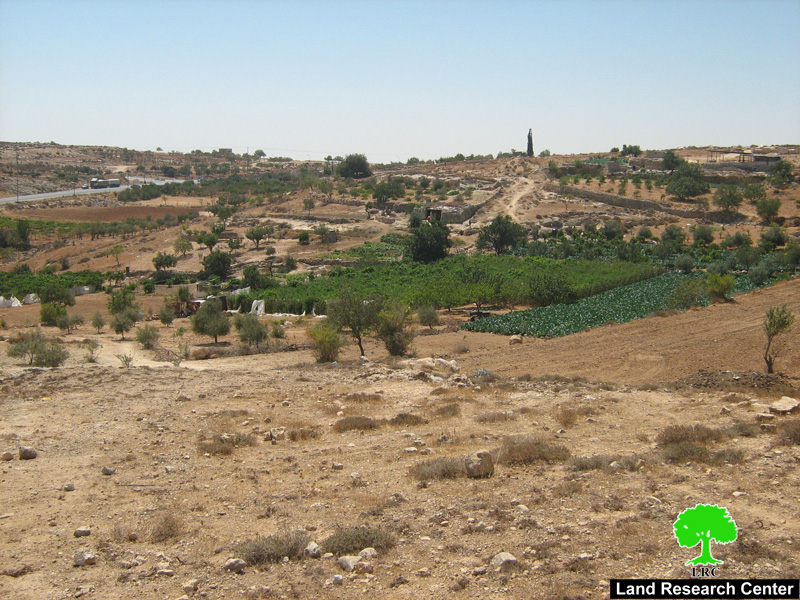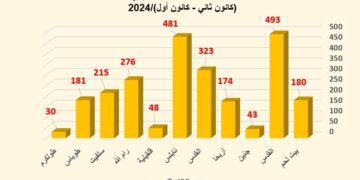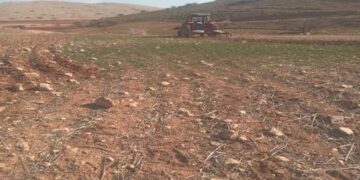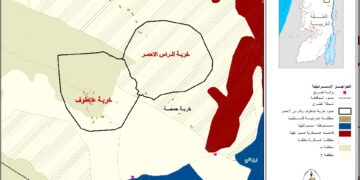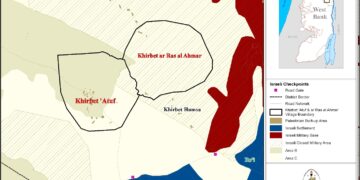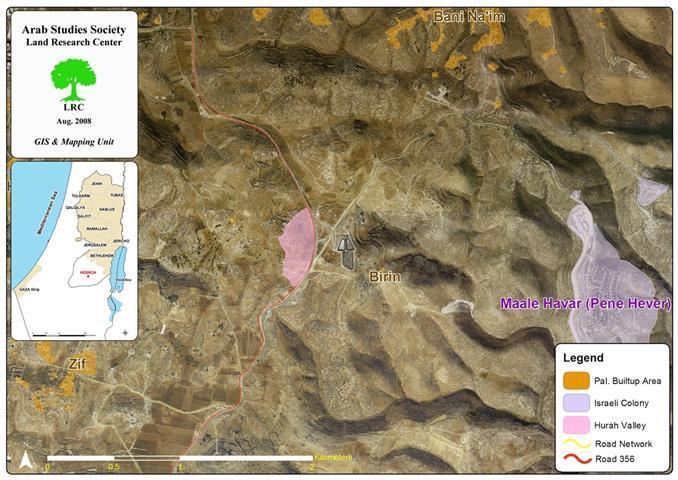A group of Israeli colonists, guarded by the Israeli occupation army and police, attacked on August 13th, 2008 Palestinian farmers and their crops in Wadi Houra south of the City of Hebron. The attacked farmers indicated that around 25 colonists, protected by 6 military and police jeeps and accompanied by a bulldozer and a truck, raided Wadi Houra at 5:00 AM of the said day and uprooted irrigation and water networks used to grow crops on Palestinian lands. The colonists have also uprooted tomato and cabbage seedlings and destroyed what they could beneath the tires of the jeeps and other vehicles.
Photo 1: Cabbage seedlings destroyed by the colonists.
The farmers indicated that the colonists came in from nearby colonies wearing 'a yellow uniform' and that some of them spoke Arabic. The colonists told the farmers that the land is 'owned' by the colonists and that Palestinians are 'forbidden' from farming or gaining access to it. The colonists have also accused Palestinians of stealing water for the main water pipes. The Palestinian refuted and flatly rejected the Jewish ownership of the land and indicated that the only water used in the irrigation of the plants is rain water collected in cisterns.
Photo 2: A water tank damaged by the colonist
The farmers also added that the colonist collected all of the irrigation pipes and then cut them using sharp knives. They have also stolen most of the irrigation networks from the lands that were prepared for plantation. In addition, the colonists destroyed and damaged vegetable boxes and the plastic placed around tomato seedlings as well as plastic boxes used for fertilizer transport. They even threw sand and tree branches in one of the water cisterns and when the farmers tried to stop them the colonists pointed guns at them and forced them out of their humble home.
Photo 3 & Photo 4: The damaged irrigation networks
Photo 5: The water cistern that was polluted by the colonists
The colonists apprehended one of the farmers named Abdel Ra'oof Brqan (age:36 years old) and delivered him to the Israeli Police that was accompanying them. When his brother, Sadiq Burqan, tried to prevent the arrest of his brother, he was arrested too. They were transported to the Russian Compound in Jerusalem and they were still under arrest until the preparation of this report. That is despite the fact that Sadiq is chronically sick and has a disability in his leg that needs constant medical care.
The attack that was carried out by the colonists in the time period between 5:00 AM and noon has caused great economical damage to the residents of Wadi Houra. Mr. Yaqoub Ishaq Burqan and Mr. As'aad Yousef Burqan (who both own 11 dunums in the area) indicated that a truck cargo of irrigation plastic pipes valued at NIS 5,000 was stolen in addition to the uprooting of existing irrigation networks. Also, the colonists stole a fertilizer in addition to 800 irrigation points while using a bulldozer to ruin the land and the seeds planted in it. Both Mr. Burqans estimate the loss at about NIS 10,000.
The farmer Hasan Abdullah Burqan owns 3 dunums in the area. The colonists uprooted 2000 meters of his irrigation networks while removing the main irrigation points and damaging his grape orchard. Moreover, the colonists attacked his children and women as they threatened them with gunfire while removing them out of the house before searching it. The farmer Samir Jouda Burqan owns 1 dunum that was planted with vegetables. The colonists stole his irrigation system at a loss of NIS 1,000.
The farmer Motaz Yousef Burqan owns 1 dunum also. The colonists removed the irrigation system he used to irrigate his tomato seedlings. In addition, they have broken the vegetable boxes after dumping all of its tomato content on the ground. This action forced him to collect the reaming tomatoes and pile them in big piles while awaiting the arrival of new boxes. He estimates his loss at NIS 1,000.
Photo 6: The piles of tomatoes awaiting new boxes in the aftermath of the colonists attack
The farmer Nawwaf Abu Isneina owns a cow farm in Wadi Houra. During the attack the colonists assaulted him and the workers in his farm. They also stole a generator that he uses to pump water from nearby cisterns. Moreover, the colonists stole electrical wires and cables from the farm while chasing away one of his sons (the 19-year old Lo'ai) when he tried to stop them. He was, and still is, under arrest. The Police accused Mr. Abu Isneina of stealing water from the water lines running through the Wadi. Yet, he denied the accusation and pointed out to the Police the cisterns from which he pumps water from and showed them water purchase invoices as a proof. However, the Police did not believe him and kept his son under arrest.
Photo 7: An agricultural brux owned by Mr. Nawwaf Abu Isneina which was attacked in 2002.
On the same day of the attack on Wadi Houra, the colonists raided also the nearby Wadi Al Baqr and stole irrigation networks in addition to milk and water tanks from Al Rajabi farm. The following table lists the damages incurred during the colonists attack:
|
Name of farmer |
Area in dunums |
Stolen Goods |
Losses in NIS |
Notes |
|
Ya'qooub Ishaq Burqan and As'ad Yousef Burqan |
11 |
A truck load of irrigation network |
5,000 |
|
|
A fertilizer |
1,000 |
|
||
|
8000 irrigation points |
4,000 |
|
||
|
Hasan Abdullah Burqan |
3 |
2000 meters of irrigation network |
3,000 |
|
|
Samir Jouda Burqan |
1 |
1000 meters of irrigation pipes |
1,000 |
|
|
Motaz Yousef Burqan |
1 |
1000 meters of irrigation pipes |
1,000 |
|
|
Nawaf Abu Isneina |
|
Water pump, electrical wires and cables |
1,000 |
Cow farm |
|
Al Rajabi Cow Farm |
|
Irrigation networks as water and milk tanks |
N.A |
Cow farm |
|
TOTAL |
16 |
|
16,000 |
|
The Palestinian farmers in Wadi Houra estimated that the attack and the general Israeli policies against them are designed to force them to leave their lands as a prelude for their annexation into the nearby colonies. That is in addition to the imposition of a deliberate policy to fight them in their livelihoods as they depend only on agriculture as their main source of income. The farmers have mentioned some of the previous attacks carried out by the colonists as to force them out of their lands. Such attacks included:
-
The construction of agricultural roads on Palestinian private lands to be used exclusively by colonists.
-
The placement of large quantities of debris and sand on the slope of one of the mountains in the area in an initial attempt to establish a colonial outpost. Soldiers have used the same location since 2000 as a radar station. The station, however, was since removed.
-
In 2006 one of the colonists shot and injured a Palestinian farmer while grazing in his land in the Wadi. In addition, a colonist ran over a Palestinian girl resident of the Wadi near Road 60. The girl currently suffers from brain damage.
-
In 2002 Israeli occupation forces demolished an agricultural house owned by Mr. Majed Ibrahim Burqan. They have also damaged agricultural bruxes owned by Mr. Sidqi Awad Burqan and Mr. Nawwaf Abu Isneina.
-
The Wadi is rich in the different soil formations. It has a mountain that is rich in white and red sand that is usually used in the production of glass and pottery. However, this mountain is out of reach of the Palestinians; in 2006 when a Palestinian man started uploading quantities of red sand into his truck, colonists and Israeli police surrounded him, threw him out and confiscated his truck and bulldozer which were returned back to him after paying a fine of NIS 40,000.
Photo 8: Picture of the rich mountain of white and red sand.
-
Israeli colonists established in the year 2000 a cesspit pool to collect sewage water from the colonies of Hagai and Bnei Hever. The awful odor stemming from the pool has caused nausea for the Palestinians living nearby. Yet, occupation forces dried the pool out to protect the health of colonists residing in Bnei Hever colony. However, the pool itself is still present for any possible future use by the colonists.
What Next?
As a result of the systematic harassment by the colonists against the Palestinian farmers in Wadi Houra, the farmers were forced to leave their farms at night in fear of possible nightly attacks against them by the colonists. They live in constant fear that the next day would come only for them to find their crops uprooted or even destroyed.
Wadi Houra: A Profile:
The Wadi is located between the towns of Yatta and Bani Nu'eim in the southeastern parts of the Governorate of Hebron. Its area is estimated to be 300 dunums of the best agricultural lands in the Governorate. Part of it is planted with vegetables and almonds while the other part is planted with grains. By-Pass Road 60 cuts through the Wadi while the Palestinian residents are prohibited from building in it. Ownership of the lands of the Wadi is distributed between the clans of Burqan, Abu Isneina and the Bedouin clans of Hanjouri, Al Azzazmeh and Al Mawaheen who are also subjected to stealing their flocks by the colonists. In terms of water access, Palestinians are allowed to use only a small number of cisterns in the area while access to the larger portion of cisterns is prohibited by both the colonists and occupation soldiers.
Photo 9: A general view of Wadi Houra
A number of water springs are present in the Wadi including the springs of Birien, Al Shunnar, Umm Al Nawa'eir and Umm Zaitoona. However, Israeli occupation forces have prevented Palestinians from accessing or using them. Palestinians are also prevented from drilling for water or constructing cisterns to take advantage of the underground water.
Prepared by:
The Land Research Center
LRC


